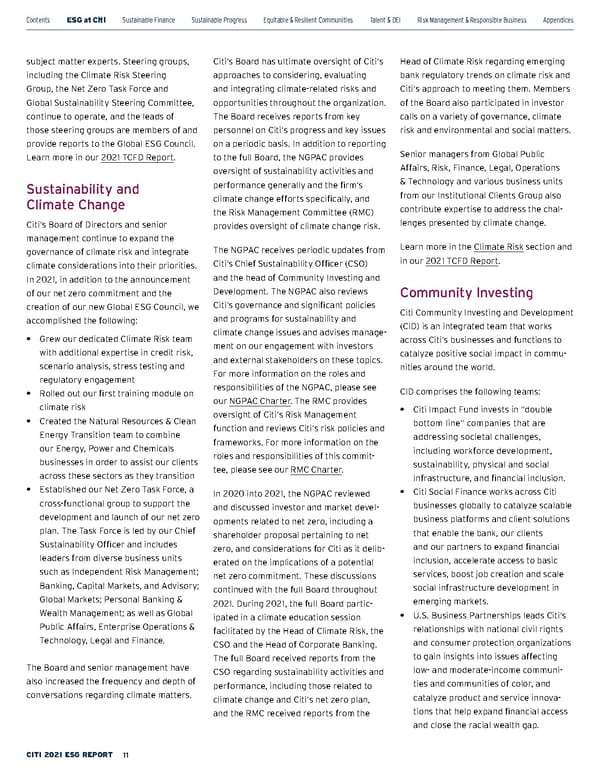subject matter experts. Steering groups, including the Climate Risk Steering Group, the Net Zero Task Force and Global Sustainability Steering Committee, continue to operate, and the leads of those steering groups are members of and provide reports to the Global ESG Council. Learn more in our 2021 TCFD Report . Sustainability and Climate Change Citi’s Board of Directors and senior management continue to expand the governance of climate risk and integrate climate considerations into their priorities. In 2021, in addition to the announcement of our net zero commitment and the creation of our new Global ESG Council, we accomplished t he f ollowing: • Grew our dedicated Climate Risk team with additional expertise in credit risk, scenario analysis, stress testing and regulatory en gagement • Rolled out our first training module on climate risk • Created the Natural Resources & Clean Energy Transition team to combine our Energy, Power and Chemicals businesses in order to assist our clients across these sectors as they transition • Established our Net Zero Task Force, a cross-functional group to support the development and launch of our net zero plan. The Task Force is led by our Chief Sustainability Officer and includes leaders from diverse business units such as Independent Risk Management; Banking, Capital Markets, and Advisory; Global Markets; Personal Banking & Wealth Management; as well as Global Public Affairs, Enterprise Operations & Technology, Legal and Finance. The Board and senior management have also increased the frequency and depth of conversations regarding climate matters. Citi’s Board has ultimate oversight of Citi’s approaches to considering, evaluating and integrating climate-related risks and opportunities throughout the organization. The Board receives reports from key personnel on Citi’s progress and key issues on a periodic basis. In addition to reporting to the full Board, the NGPAC provides oversight of sustainability activities and performance generally and the firm’s climate change efforts specifically, and the Risk Management Committee (RMC) provides oversight of climate change risk. The N GPAC r eceives p eriodic u pdates f rom Citi’s C hief S ustainability O fficer ( CSO) and t he h ead o f C ommunity I nvesting a nd Development. T he N GPAC a lso r eviews Citi’s g overnance a nd s ignificant p olicies and p rograms f or su stainability a nd climate c hange i ssues a nd a dvises m anage - ment o n o ur e ngagement w ith i nvestors and e xternal s takeholders o n t hese t opics. For more information on the roles and responsibilities o f t he N GPAC, p lease s ee our NGPAC C harter . T he R MC p rovides oversight o f C iti’s R isk M anagement function a nd r eviews C iti’s r isk p olicies a nd frameworks. F or m ore i nformation on t he roles and responsibilities of this commit - tee, p lease s ee o ur RMC Charter . In 2020 into 2021, the NGPAC reviewed and discussed investor and market devel - opments related to net zero, including a shareholder proposal pertaining to net zero, and considerations for Citi as it delib - erated on the implications of a potential net zero commitment. These discussions continued with the full Board throughout 2021. During 2021, the full Board partic - ipated in a climate education session facilitated by the Head of Climate Risk, the CSO and the Head of Corporate Banking. The full Board received reports from the CSO regarding sustainability activities and performance, including those related to climate change and Citi’s net zero plan, and the RMC received reports from the Head of Climate Risk regarding emerging bank regulatory trends on climate risk and Citi’s approach to meeting them. Members of the Board also participated in investor calls on a variety of governance, climate risk and environmental and social matters. Senior managers from Global Public Affairs, Risk, Finance, Legal, Operations & Technology and various business units from our Institutional Clients Group also contribute expertise to address the chal - lenges presented by climate change. Learn more in the Climate Risk section and in our 2021 TCFD Report . Community Investing Citi C ommunity I nvesting a nd D evelopment (CID) is an integrated team that works across Citi’s businesses and functions to catalyze positive social impact in commu - nities around the world. CID comprises the following teams: • Citi Impact Fund invests in “double bottom line” companies that are addressing societal challenges, including workforce development, sustainability, physical and social infrastructure, and financial inclusion. • Citi Social Finance works across Citi businesses globally to catalyze scalable business platforms and client solutions that enable the bank, our clients and our partners to expand financial inclusion, accelerate access to basic services, boost job creation and scale social infrastructure development in emerging m arkets. • U.S. Business Partnerships leads Citi’s relationships with national civil rights and consumer protection organizations to gain insights into issues affecting low- and moderate-income communi - ties and communities of color, and catalyze product and service innova - tions that help expand financial access and close the racial wealth gap. Contents ESGatCiti SustainableFinance SustainableProgress Equitable&ResilientCommunities Talent&DEI RiskManagement&ResponsibleBusiness Appendices CITI 2021 ESG REPORT 11
 Citi ESG Report Page 10 Page 12
Citi ESG Report Page 10 Page 12